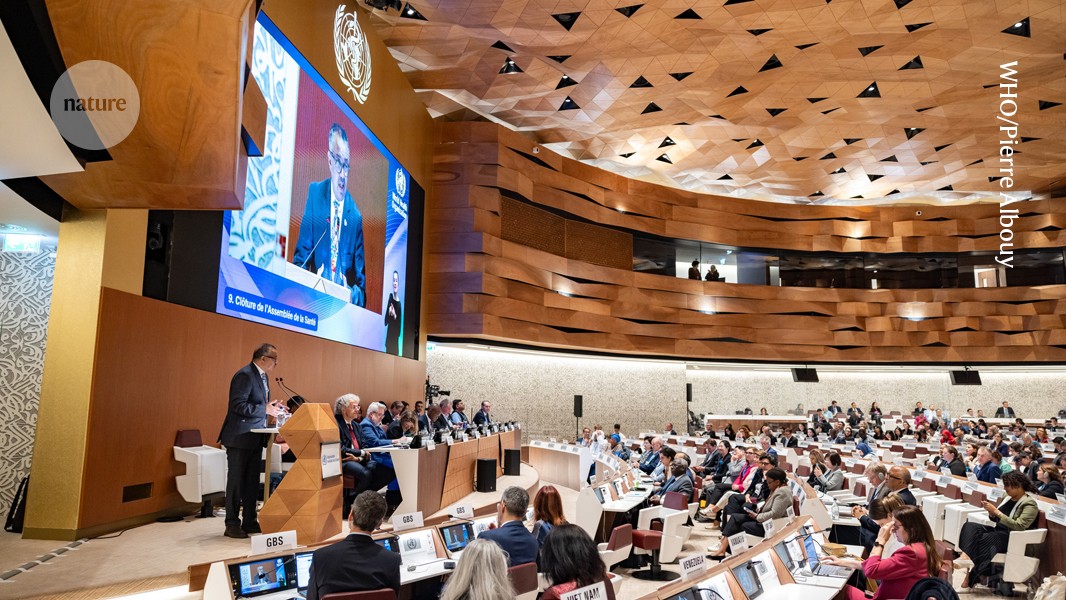Hope for global pandemic treaty rises — despite missed deadline

Delegates were at an impasse over key issues, but agreements on other public-health emergency measures sparks cautious optimism

Delegates to the World Health Assembly, which concluded on 1 June, failed to reach agreement on a pandemic treaty. Credit: WHO/Pierre Albouy
Countries have failed to hammer out a global pandemic treaty by their original deadline, but there is growing optimism that an extension until 2025 will allow them to reach consensus.
Despite a deadlock over issues of equity, member states of the World Health Organization (WHO) gave themselves another 12 months to work on the pact, which aims to improve the world’s response to future pandemics. That willingness to extend the talks signals nations’ commitment to the treaty, say public health specialists. Observers cited another reason for hope: countries did manage to adopt a separate agreement to prevent the global spread of infectious diseases, a success that could help to build momentum for the pandemic treaty discussions.
The agreement and the extension were both announced on 1 June, the final day of the 2024 World Health Assembly, the WHO’s annual decision-making meeting in Geneva.
“There was a great weariness setting in Geneva,” says Lawrence Gostin, a specialist in health law and policy at Georgetown University in Washington DC, who closely followed the negotiations. But the new deadline “was a good outcome. It showed that there still is a political will to try to get this accomplished and not walk away from the table.”
“One year is a good, reasonable time” to conclude the negotiations, says KM Gopakumar, a senior researcher with the Third World Network, a research and advocacy organisation in Penang, Malaysia. He says that rushing the discussions to meet the original deadline could have compromised the legitimacy of the process and even reinforced inequities.
A final text is expected by the next assembly, to be held in May 2025.
Sticking points
Member states agreed on many items in the agreement’s draft, but they could not reach consensus on some key topics, among them the sharing of samples and genomic sequences of pathogens that could cause a pandemic. Many low- and middle-income countries argue that nations that promptly give access to pathogen data should have automatic access to vaccines, medications and tests developed using those data. But other countries, mainly those with strong pharmaceutical industries, oppose such conditions for data sharing.
Another important measure still in dispute, according to Michelle Childs, policy advocacy director at the non-profit Drugs for Neglected Diseases initiative in Geneva, is a potential requirement that vaccines and drugs developed with government funding are shared more equitably than during the COVID-19 pandemic. “There is already a provision in the draft text, but it has a number of recently proposed caveats that could water down its purpose and effect,” she says.
Defining ‘pandemic’
During the assembly, countries did succeed in agreeing to a package of amendments to the International Health Regulations (IHR), legally binding rules designed to curb the spread of infectious diseases between countries. The amendments include the introduction of a “pandemic emergency” definition. Until now, the WHO could not officially declare a pandemic, only a “public health emergency of international concern”. The new definition represents a higher level of alarm that would trigger a more effective international response.
Several delegates speaking at the assembly said the adoption of the amendments would re-energize the efforts to forge a pandemic treaty. “This in our view will create a pivotal moment to accelerate the discussions in the pandemic agreement and complete our unfinished work,” said Mekdes Daba, Ethiopia’s minister of Health, speaking on behalf of a large group of African member states.
The updated IHR might also provide clarity on the remaining pandemic treaty discussions, as some of the instruments’ goals overlap, Gostin adds.
But not all observers are optimistic about the treaty’s future. “They could eventually approve some sort of agreement,” says Nina Schwalbe, a public health researcher and founder of public health think tank Spark Street Advisors, in New York City. “But the question is whether it will represent a meaningful step change for equity or have any commitment to accountability.”
doi: https://doi.org/10.1038/d41586-024-01658-5
This story originally appeared on: Nature - Author:Mariana Lenharo

















